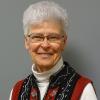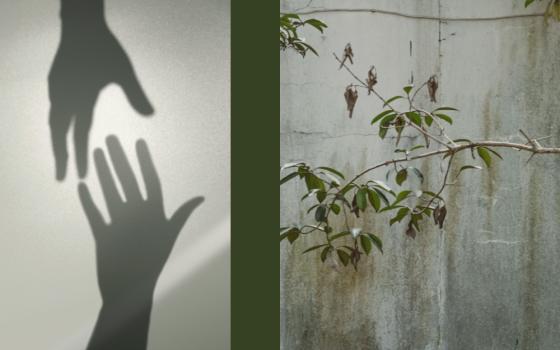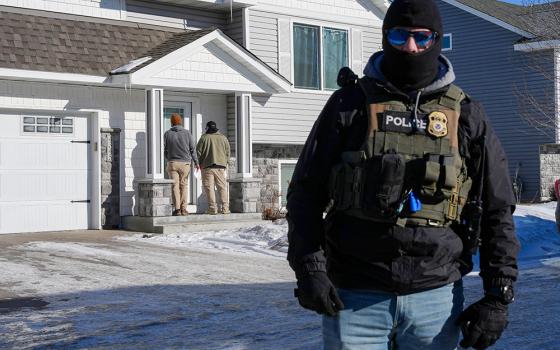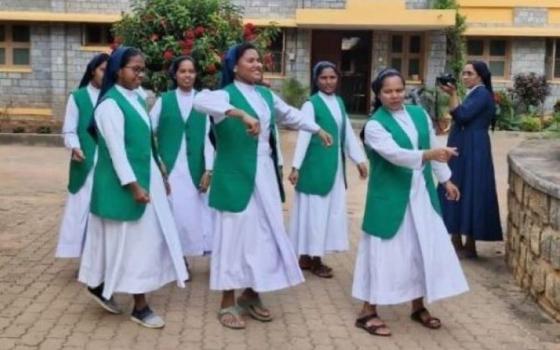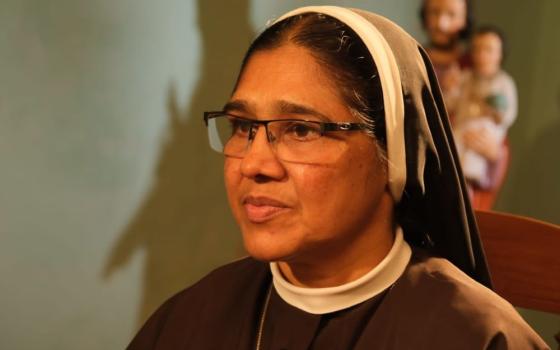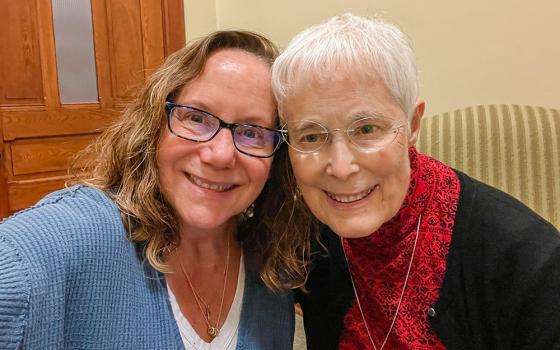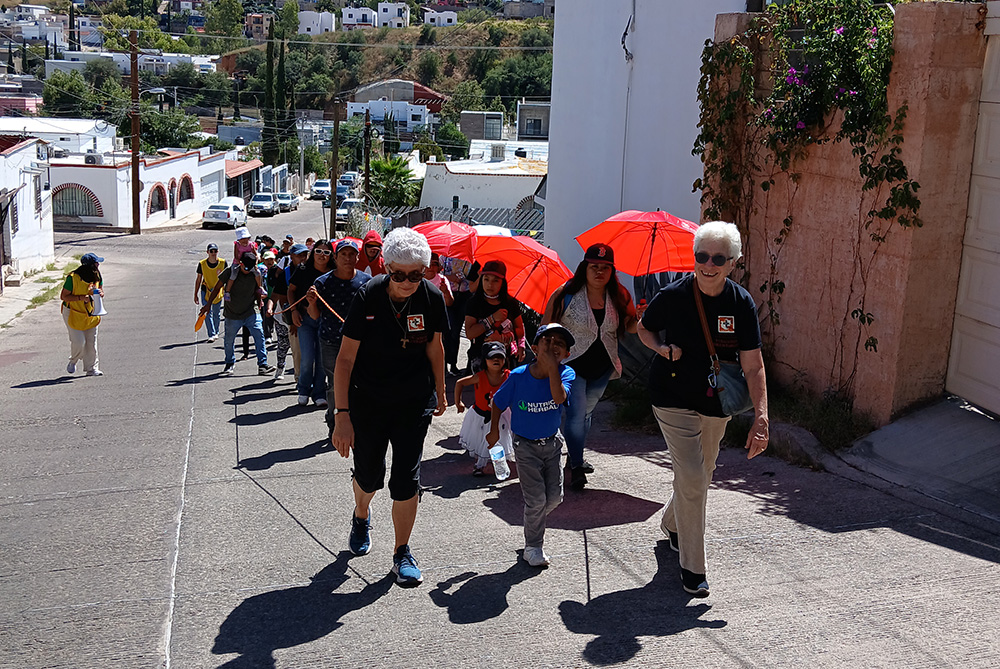
Sr. Diana De Bruin, a Sister of St. Francis of Assisi, Milwaukee, and Dominican Sr. Gemma Doll led a migrant procession through Nogales, Sonora, Mexico, in celebration of World Day of Migrants and Refugees on Sept. 29, 2024. (Courtesy of Kino Border Initiative)
On March 3, Pope Francis declared that the world's migrants are "missionaries of hope," an empowering title and the theme of the 111th World Day of Migrants and Refugees, to be celebrated Oct. 4-5. This is in stark contrast to the dehumanizing narrative we encounter from the current Trump administration.
As missionaries of hope, migrants are both recognized and celebrated for their resilience, courage and faith. "They bear witness to hope for the future despite difficulties. It is the hope of happiness beyond borders that leads them to entrust themselves totally to God," the Dicastery for Promoting Integral Human Development said in the March 3 daily bulletin.
I was witness to such hope when in September 2024, I traveled to Nogales, Sonora, Mexico, to minister with Catholic Sisters Walking with Migrants, a Conrad N. Hilton Foundation-funded program administered through the Kino Border Initiative. (The Hilton Foundation is a major funder of Global Sisters Report.)
Advertisement
Having just finished four terms of leadership in my congregation, the Sisters of St. Francis of Assisi, Milwaukee, I learned of the opportunity to walk with families seeking asylum at the Arizona border, about an hour south of Tucson. I reflected and prayed on this unique call to serve, as for some time I had been observing what was going on along the border in the news and wanted to help people who had to flee their homes in hope of finding a place in the U.S. where they could live in safety and raise their families.
Then a friend of mine sent me a quote by Lilla Watson, an Aboriginal woman from Australia who explained to well-intentioned folk coming to help there: "If you come here to help me, you are wasting your time. But if you have come because your liberation is bound to mine, then let us work together." This quote touched me deeply as I too believed that my liberation was bound to the migrants and when they were not free, neither was I. I decided to apply for the program, not to serve, but, as Lilla said, "to work together."
Upon arriving, I felt overwhelmed as I learned of the trauma that people in migration, primarily asylum seekers, experienced before they arrived at the Kino Border Initiative. Equally, I marveled that their faith could be so strong and resilient and they could be so grateful for everything. My faith was deepened because of their example.
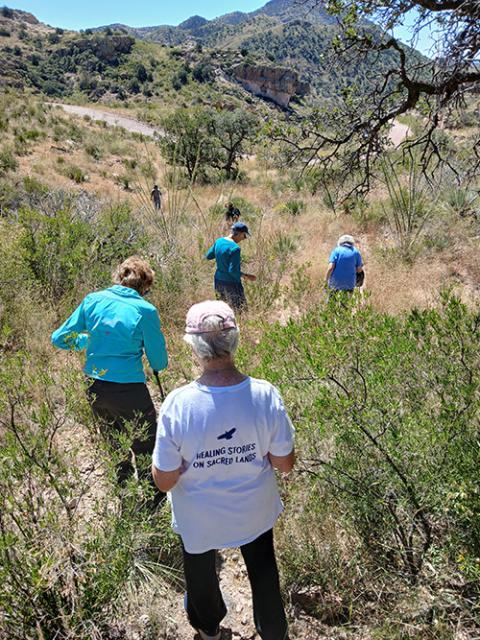
Sr. Diana De Bruin, a Sister of St. Francis of Assisi, Milwaukee, and Dominican Sr. Gemma Doll with others making a water and food drop in the Sonoran desert, near Arivaca, Ariz. (Courtesy of Kino Border Initiative)
One example I witnessed multiple times was the importance of families staying together, an area of great concern for the U.S. bishops' conference and highlighted in a recently published joint report, noting that "one out of five Catholics are either vulnerable to deportation themselves or could see a family member deported, barring law or policy changes," according to OSV News.
The first week I was at Kino Border Initiative, I met twin 16-year-old boys that were living at the center for 10 days. I was so impressed with their commitment to remain together as a family, no matter what. They were a part of a family of five, and they said that with all the challenges their family endured, they would do it again to remain together.
Communicating care and compassion was important for me as I worked at Kino Border Initiative. I tried to be creative in bridging the language difference and witnessing my own cultural humility as a native English speaker in a Spanish-speaking environment. I studied Spanish before moving to Nogales and was quick to have my phone ready, reading through an app that translated in real time what was being said in a conversation where Spanish was the only language spoken. I know how important it is that someone treats them with dignity and I made an effort to communicate that to people I encountered there.
I remember that near the end of my monthlong program I would say to others, "Tú vales," which means "you matter." I would also tell people, "When you are not free, there is a piece of me not free." I know it touched their hearts by the looks on their faces. I hoped that the care I shared and the compassion I felt continued with these families as they departed from the Kino Border Initiative.
I remember being able to say goodbye to four families at different times during the month I was there. With each one, I prayed, blessed them and hugged them. They hugged back as if they would never let go. I can still see their faces before they walked out of the center. I carry that experience in my heart. I think I will forever. They live within each migrant and refugee I meet in Milwaukee.
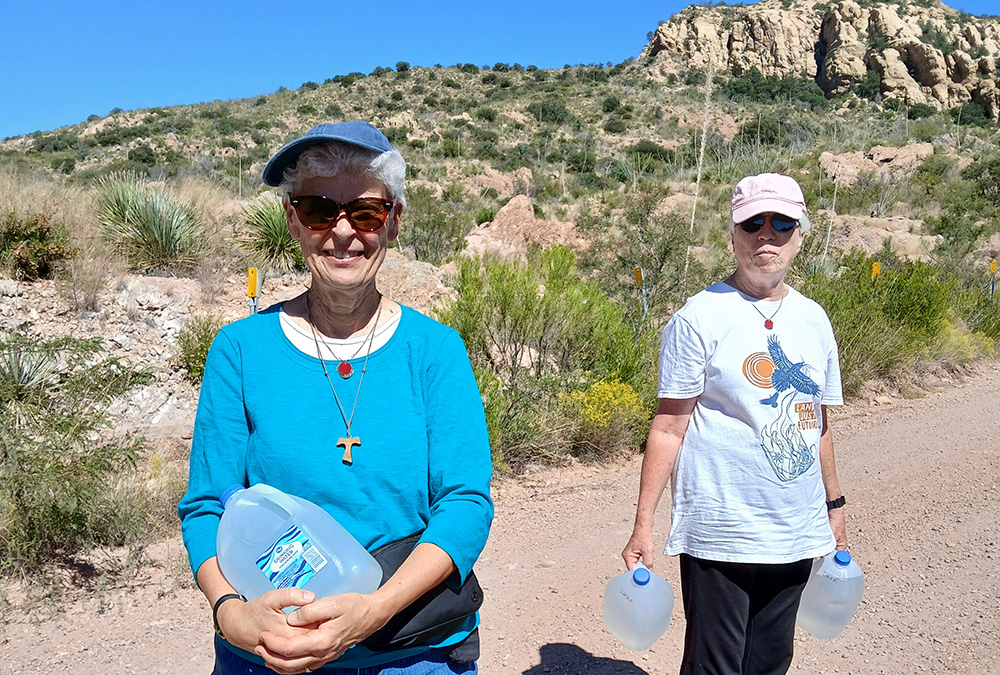
Sr. Diana De Bruin, a Sister of St. Francis of Assisi, Milwaukee, and Dominican Sr. Gemma Doll prepare to make a water drop in the Sonoran desert along a suspected migrant trail. (Courtesy of Kino Border Initiative)
These days, I accompany people through St. Elizabeth Ann Seton Parish's Migrant Ministry in New Berlin, Wisconsin, visiting the state's detention center and supporting migrants at Milwaukee's Catholic Charities. I assist in filling out legal documentation, helping create a plan for a parent if they face possible deportation and ensuring they know their rights in Wisconsin. I do my part to help those in the city here feel safe, free and at peace in as many little ways as I can. My freedom is still bound to their freedom. I probably will never see the migrants I was with at Kino Border Initiative, yet I feel they are my extended family in a very special way.
Evangelized by the missionaries of hope I met at the Kino Border Initiative, I try to continue the mission of Catholic Sisters Walking with Migrants in Milwaukee. My hope is that migrants and refugees will be treated with dignity, kindness and compassion and one day they will live among us freely as friends, neighbors and fellow citizens without being fearful of deportation. I hope that they will be able to raise their families with peace, security and happiness.
